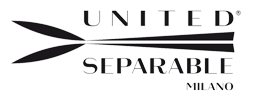Minimal Path Project
A new chapter
Born as the natural evolution of United Separable
The Minimal Path Project transforms the experience of modular and circular fashion into a consulting approach for SMEs and startups – based on clear, proportional ESG tools shaped by real practice.
A two-tier framework
1
United Separable Framework (quick start)
- Ecodesign Index → observes materials, durability, and product design impact.
- Supplier Transparency Score (STS) → assesses openness, traceability and responsibility across the upstream supply chain.
2
LCA-light Framework (extended analysis)
Integrates the initial KPIs into a broader assessment across the entire value chain (upstream, core, downstream), introducing a dedicated indicator:
- Circularity Index → provides an overview of the overall ability to reduce waste, recover resources, and regenerate value throughout the product life cycle.
The method
Complete and homogeneous data are not always available – especially for small enterprises. That’s why our approach relies on estimates built on declared criteria and explicit weightings, applied only to parameters that are truly relevant.
This logic allows us to:
- Achieve consistent and comparable results, even across different contexts.
- Avoid both the rigidity of overly complex models and the superficiality of unstructured checklists.
- Build credible internal indicators, useful for making informed decisions.
We don’t aim to replace official standards (ISO, LCA, CSRD), but to create a solid entry-level foundation for documenting processes, developing internal tools, and preparing consciously for the reporting and Digital Product Passport requirements. Our approach follows the logic of rapid prototyping: lightweight, iterative models that can evolve and improve over time. The goal is not to offer a definitive map, but to provide a starting point for more conscious design and decision-making.

From prototype to case study
The Flow 3.0 collection turns design reflection into practical experiment.
Through modular and transformable garments designed to last, the principles of modularity, ecodesign, and supply chain transparency were tested, and the impacts across the entire value chain were assessed.
The learnings from this phase shaped an approach that combines design reflection and practical application.

Why MP Project
- Direct experience → methods developed in the field, starting from a real project.
- Practical approach → from product design to ESG strategy, with attention to EU regulations.
- Proportionate tools → designed also for micro and small enterprises.
- Autonomy → the goal is to transfer a method: once set up, the tools can be managed independently and used as a foundation for certifications and reporting.
Recognition and outreach
Milano Circolare → MP Project is part of Milano Circolare, the official catalogue that highlights initiatives and organisations committed to the transition toward a circular economy.
STEM and Communication → The modular system project has also been presented through mathematical models – a way to express design through a rigorous language, and at the same time inspire young women to explore STEM disciplines (Science, Technology, Engineering and Mathematics).
Let’s Work Together
Every business can choose to grow more consciously, at its own rhythm, with its own resources. With MP Project, we share simple tools, a clear method, and hands-on support to accompany this journey toward circularity and awareness.
